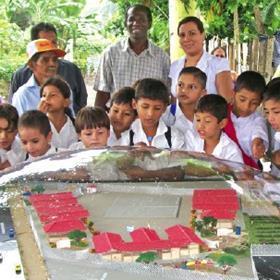
In these economically challenging times, a casual observer could perhaps be forgiven for thinking that issues such as fair worker treatment, environmental sustainability and respect for surrounding communities had slipped down companies’ agendas, being supplanted by an emphasis on cutting costs and maximising margins. However, far from neglecting such concerns, many leading multinationals appear keen to demonstrate their ongoing commitment to corporate social responsibility (CSR).
Among the major developments in the field has been Dole’s recent announcement that it has created a new Office of Corporate Social Responsibility and Sustainability. The newly-formed department, it says, will 'look to build upon its existing environmental initiatives at company-owned farms around the world'.
The company said the Office of Corporate Social Responsibility and Sustainability replaces Dole’s erstwhile Office of Corporate Social Responsibility, but in addition to employees and communities would give additional focus to three “priority initiatives” – carbon footprint reduction, soil conservation and water management.
For Sylvain Cuperlier, Dole’s vice-president of worldwide corporate responsibility and sustainability, these areas now represent the company’s “three pillars of sustainable agriculture”, upon which its CSR programmes are being constructed.
Key initiatives in these areas, he says, are the “comprehensive calculation” of product carbon footprints, which is aimed at helping “spot and leverage efficiency potentials along the entire supply chain, introducing highly water efficient packaging plants and providing training on soil conservation to producers”.
In addition to an increased focus on sustainability, Mr Cuperlier says Dole’s CSR department will continue to manage some of the more ‘traditional’ aspects of the field, including programmes to benefit communities in production areas where it operates.
As an example, he cites the launch of a new mobile medical unit, which offers some rural communities of the Atlantic Coast of Costa Rica access to preventive medicine and specialised health attention.
Not to be outdone, Chiquita Brands International was rewarded earlier this year for its dedication to environmental sustainability with the 2009 Circle of Excellence Award, a prestigious recognition of CSR initiatives and environmental protection.
The award, which is handed out by the Distribution Business Management Association (DBMA), was given to Chiquita as the company said to “best exemplify” current corporate commitment, past demonstrated programmes, and plans for continued commitment.
In a statement, DBMA executive director Amy Thorn said Chiquita stood out from other business because of its ongoing green transportation initiatives that focused on reducing carbon emissions in transportation throughout North America.
According to Mr Cuperlier, being “good citizens” is now “a must” for global companies, although he stresses that Dole’s own CSR work stretches back to 1924, when it built the Vicente d’Antoni hospital in Honduras, which still exists today.
“Our focus on the three pillars of sustainability goes beyond the concept of ‘good citizen’,” he says. “It contributes to identify the key areas on which we must concentrate, so that future generations can inherit a healthy environment.”
Key to this, he continues, has been the long-term relationships, that Dole has developed with its independent growers, some of which have been selling to the firm for 40 years.
Such a relationship, Mr Cuperlier argues, has been “a crucial factor” in making sure that its associated producers are familiar with its standards and comply with them.
Of course, he says that Dole does rely on third party certifications to demonstrate that it complies with internationally recognised environmental and labor standards.
“In 1998, our division in Costa Rica was the first agricultural company in the world to become certified to ISO 14001, the environmental standard – today, all Dole banana and pineapple divisions are certified to ISO 14001,” says Mr Cuperlier.
He says that over 40,000 Dole employees are also protected by SA 8000, a labour standard which covers areas such as freedom of association and the right to collective bargaining, decent wages and reasonable working hours.
Another example of the company’s work with communities surrounding plantations, Mr Cuperlier says, was its the 2008 inauguration of a school in Ecuador that is attended by over 300 children. This €242,000 (US$300,000) project was co-funded by Dole and Bama, a Dole customer in Norway.
In common with Dole, major fresh produce importer Fyffes also bases its CSR policy on adherence to standards – in this case, its own codes of practice together with its GLOBALGAP and Ethical Trading Initiative (ETI) memberships.
According to Paul Barrett, Fyffes’ UK brand manager, alongside regularly reviewing and updating these codes, the company also supports such policies through its continuing commitment to Fairtrade bananas.
“Fyffes is the largest importer of Fairtrade bananas into Europe, primarily from Colombia and Dominican Republic, which has a positive impact on the communities from which they are sourced,” he says.
But while stressing that “like any responsible business”, Fyffes takes its CSR commitments “very seriously”, Mr Barrett says the company believes that “acting in a socially responsible and ethical way is the important thing rather than looking for recognition or plaudits”.
“The codes of practice cover internationally accepted social, labour, food safety and environmental standards – all growers in our supply chain are expected to adhere to the codes and are audited for compliance,” he explains.



